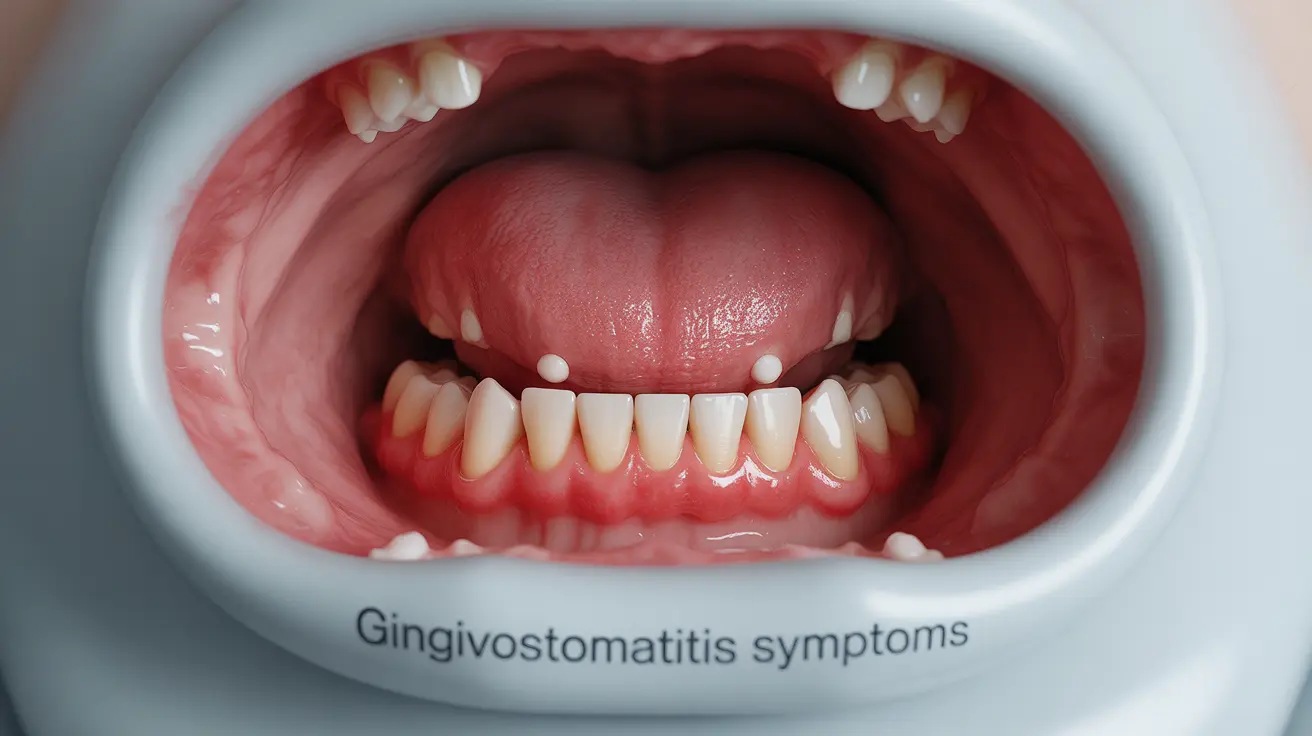Gingivostomatitis is an inflammatory condition affecting the gums and mouth that can cause significant discomfort in both children and adults. This common oral health condition typically presents with painful sores, swollen gums, and other uncomfortable symptoms that can impact daily activities like eating and drinking.
While gingivostomatitis often resolves on its own within a few weeks, understanding its symptoms, causes, and treatment options is crucial for proper management and preventing complications. This comprehensive guide will help you recognize the condition and know when to seek medical attention.
Signs and Symptoms of Gingivostomatitis
Gingivostomatitis can manifest differently in children and adults, but several common symptoms typically indicate its presence:
- Red, swollen gums that may bleed easily
- Painful mouth ulcers or sores
- Fever and general malaise
- Swollen lymph nodes
- Bad breath
- Difficulty eating or drinking
- Increased drooling (especially in children)
- Irritability and discomfort
Common Causes and Risk Factors
Understanding what causes gingivostomatitis can help in prevention and management. The condition most commonly results from:
Viral Infections
The herpes simplex virus (HSV-1) is a primary cause, particularly in children. This initial infection can lead to recurring outbreaks later in life.
Bacterial Infections
Poor oral hygiene can lead to bacterial growth, contributing to gum inflammation and infection.
Other Contributing Factors
- Poor dental hygiene
- Weakened immune system
- Recent illness or stress
- Certain medications
- Nutritional deficiencies
Diagnosis and Medical Evaluation
Healthcare providers typically diagnose gingivostomatitis through:
- Physical examination of the mouth and gums
- Review of symptoms and medical history
- Sometimes, laboratory tests to identify specific viral or bacterial causes
- Evaluation of overall oral health
Treatment Approaches
Treatment for gingivostomatitis focuses on symptom relief and preventing complications. Common approaches include:
Medical Interventions
- Antiviral medications (if caused by herpes simplex virus)
- Pain relief medications
- Antimicrobial mouth rinses
- Topical anesthetics for pain management
Home Care Measures
Several self-care strategies can help manage symptoms:
- Drinking plenty of fluids to prevent dehydration
- Using salt water rinses
- Maintaining good oral hygiene
- Eating soft, cool foods
- Avoiding spicy or acidic foods that may irritate the mouth
Prevention Strategies
While not all cases of gingivostomatitis are preventable, several measures can reduce risk:
- Regular dental check-ups
- Proper oral hygiene practices
- Balanced diet rich in vitamins and minerals
- Avoiding close contact with infected individuals
- Managing stress and maintaining good overall health
Frequently Asked Questions
- What are the common symptoms of gingivostomatitis in children and adults?
Common symptoms include painful mouth sores, swollen and bleeding gums, fever, difficulty eating or drinking, and swollen lymph nodes. Children may experience more drooling and irritability compared to adults.
- How is gingivostomatitis diagnosed and when should I see a doctor for it?
Diagnosis typically involves a physical examination of the mouth and review of symptoms. See a doctor if you experience severe pain, difficulty eating or drinking, high fever, or symptoms lasting longer than two weeks.
- What causes gingivostomatitis and how can it be prevented?
The condition is primarily caused by viral infections (especially HSV-1) or bacterial infections. Prevention includes maintaining good oral hygiene, regular dental check-ups, and avoiding close contact with infected individuals.
- What treatments are available to relieve pain and speed up recovery from gingivostomatitis?
Treatments include antiviral medications, pain relievers, antimicrobial mouth rinses, and topical anesthetics. Home remedies like salt water rinses and soft, cool foods can help manage symptoms.
- Can gingivostomatitis lead to complications like dehydration, and how can these be managed?
Yes, gingivostomatitis can lead to dehydration, especially in children, due to painful swallowing. Management includes ensuring adequate fluid intake, using pain relief medications to make eating and drinking more comfortable, and monitoring for signs of dehydration.




